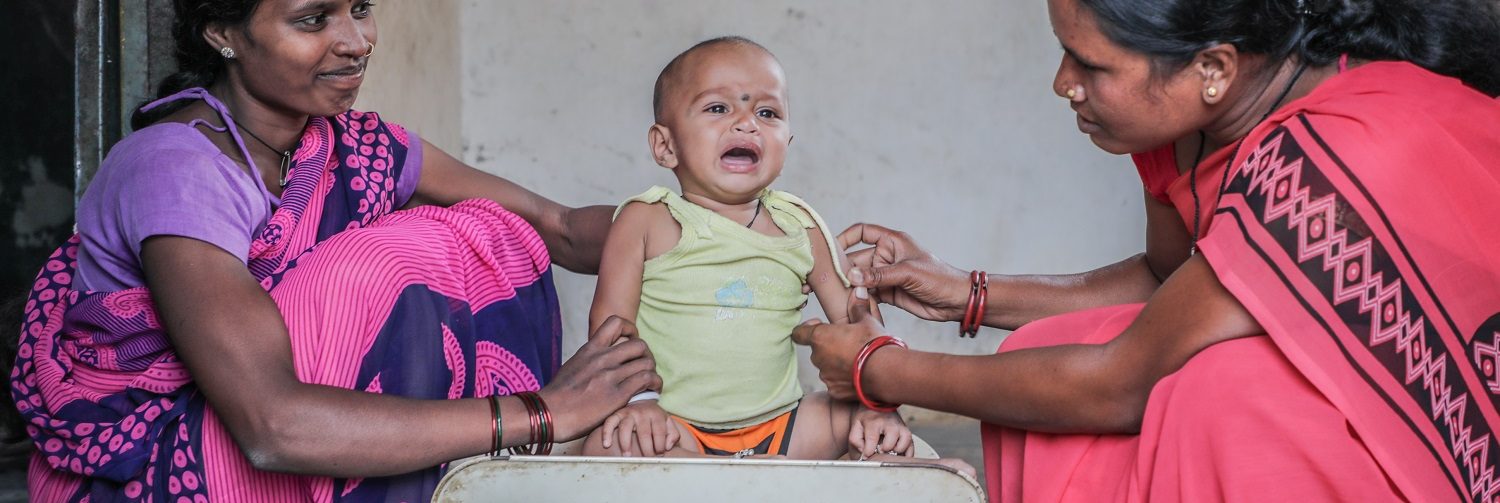
A session in progress at the technical consultation on ‘Scaling Up Maternal Nutrition Services in Health Systems in India’ in April 2018 (Image courtesy: Mohammad Fahim)
The problem: In India, maternal nutrition is a prime concern when it comes to achieving the National Nutrition Mission’s (or POSHAN Abhiyaan) targets of bringing down stunting from 38.4 percent to 25 percent by 2022, reducing under-nutrition and low birth weight by 2 percent, and anaemia by 3 percent per annum. Most Indian women enter pregnancy with poor nutrition – 23 percent women in reproductive age are too thin for their height with a body mass index less than 18.5 kg/m2 and 53 percent women are anaemic; prevalence of anaemia is upto 58 percent among pregnant women. Additionally, 8 percent of pregnant women (~4.5 million) are adolescents (NFHS-4 2015–16).
Finally, some pregnant women are at a higher nutritional risk for poor health outcomes for themselves and at risk of delivering a low birth weight baby. These are those who are too Short, too Thin, too Young and Anaemic (STY-A). They need special care, especially while living in malaria endemic zones and food insecure and poverty ridden areas. Nutrition related risk factors should be considered and included as a part of the high-risk pregnancy guidelines.
A recent technical consultation on Maternal Nutrition Services in Health Systems, organized by the Ministry of Health and Family Welfare (MoHFW) along with other organizations, in April this year, reflected on these issues and deliberated on the landscape for solutions in India.
Policy landscape for maternal nutrition in India: On the bright side, India has a strong policy framework in place for the provision of maternal nutrition services. There are interventions and platforms in India for the provision of maternal nutrition services to all 30 million pregnancies a year. World Health Organization (WHO) antenatal care guidelines 2016 have placed substantially greater emphasis on maternal nutrition assessment and provision of a set of nutrition interventions during antenatal care. These guidelines specify balanced energy protein supplementation, micronutrient supplementation (iron folic acid, calcium), deworming, gestational weight gain monitoring and counselling on nutrition and family planning, breastfeeding coupled with efforts to prevent and treat maternal infections and anaemia as core antenatal nutrition-related interventions to reduce risk of stillbirths and small-for-gestational-age newborns. Majority of these interventions are delivered through India’s health systems.
However, based on NFHS-4 data, the status of nutrition-relevant interventions during pregnancy in India shows that consumption of iron and folic acid tablets in pregnancy have remained traditionally low at 30 percent (NFHS-4 2015–16). Despite 75 percent of pregnancies being registered, the contacts during antenatal check-ups may not necessarily include nutrition related counselling and/or nutrition assessments. The levels of food supplementation and deworming services provided to women during pregnancy are also low at 53 at 20 percent respectively. Hence there is a real need to go universal with key interventions and monitor and review them.
What are some areas for action as we look ahead?
- First, on achieving universal scale of existing interventions, there is much programme data available for maternal nutrition, from HMIS (Health Monitoring Information System) and ICDS-CAS (Integrated Child Development Services – Common Application Software). But often these interventions are not recorded and reviewed.
- Second, to avoid missed opportunities for providing nutrition care, options must be explored. For example:
- It is important to make gestational weight gain monitoring and appropriate counselling a norm. Simple charts with red flag to be made available at the state, district and sub-district levels for monitoring and decision-making purposes.
- India has a national deworming day for children, but mass pregnant women deworming is not bundled with this day. Hence, deworming in pregnant women is still low at 20 percent while for children it is 80 percent (HMIS 2018). Many such untapped opportunities, where mothers visit the health facilities for the child’s immunization or nutrition rehabilitation centers, could be utilized for focusing on maternal health and nutrition during pregnancy.
- Moving towards digital methods of haemoglobin assessment and providing point of care treatment will be beneficial. Fortification with double fortified salt (iron and iodine) is worth exploring, with adequate monitoring and evaluation.
- As India’s free drug supply scheme is strengthened, actions should also ensure that supplies of micronutrient supplements are in place.
- Third, on learning from state successes and new models:
- Several states have achieved high coverage of maternal nutrition interventions as part of antenatal care; these success stories should be examined.
- Some states have started innovations around better utilization of take home ration using spot feeding approaches; learning and evaluation around this model could provide insights into its potential for further scale-up.
- It might also be prudent to tap the social capital of existing women’s livelihood-based institutions (women thrift and livelihood federations) to help strengthen maternal nutrition services.
- Fourth, since context between states and districts varies tremendously, implementation research and learning should always be bundled into the roll-out of such interventions to strengthen and optimize impact.
- Finally, although one-fifth of women in India are underweight, nearly the same number are overweight. Therefore, efforts to address maternal malnutrition now also need to focus on including methods for screening, counselling and care for maternal overweight and obesity.
By leveraging evidence from states that are positive exemplars in delivering services to address maternal malnutrition, it may be possible to ensure that interventions can be scaled-up with quality. In a bid to address all forms of malnutrition, there is an urgency to scale-up proven nutrition services for women before they enter pregnancy and/or as early as possible during pregnancy, if India wants to achieve the targets set by POSHAN Abhiyaan.
Written by Vani Sethi, Nutrition Specialist, UNICEF India, and Pratima Mathews, Communications Specialist, IFPRI, reflecting on a technical consultation on ‘Scaling Up Maternal Nutrition Services in Health Systems in India,’ organized by the Ministry of Health and Family Welfare (MoHFW) along with other government agencies and development partners in New Delhi, on 2-3 April 2018.


